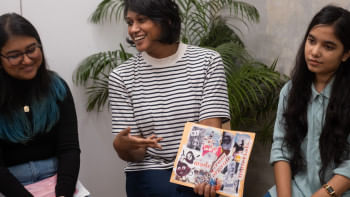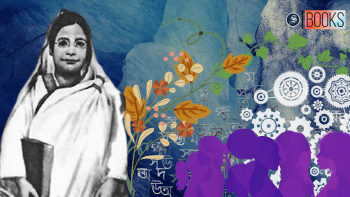Begum Rokeya
Essay / Rokeya’s relevance to Palestinian feminism
According to Merriam-Webster Dictionary (online), the first known use of the term ‘feminism’–
Views / Sultana’s Dream and the issue with feminist utopias
“They should not do anything, excuse me; they are fit for nothing.”
Tribute / Celebrating Rokeya
Rokeya Sakhawat Hossain (1880–1932) was exceptional in many different ways. Born on December 9, 1880, in a sleepy village in Rangpur, undivided Bengal, she died on the same day, 52 years later,
Begum Rokeya's 'Sultana's Dream' come to life through Spanish filmmaker
"Sultana's Dream" draws inspiration from the eponymous 1905 book by the renowned Bengali feminist thinker and writer, Begum Rokeya. The story unfolds as it follows a Spanish artist residing in India who serendipitously encounters a science fiction narrative centered on "Ladyland," a utopian society where women hold sway over the nation while men retreat to seclusion and assume responsibility for domestic chores.
FEATURE / Begum Rokeya and Begum Sufia An enduring “mother-daughter” bond
Begum Rokeya Sakhawat Hossain (1880-1932) and Begum Sufia Kamal (1911-1999), two icons in Bangla literature and culture, were not kins but kindred spirits.
The books you will meet at Dhaka Art Summit 2023
For those who are especially interested in literature in book form, the first two floors of the exhibition hold treasures.
Sister Library brings back ‘Sultana’s Dream’ and the chance to create one’s own utopia
The zine-making workshop was divided into four groups based on the central themes of Begum Rokeya’s story: arts, social justice, city planning and science & education.
BOOK EXCERPT: NONFICTION / Toward Ladyland: On the life and work of Rokeya Sakhawat Hossain
Her 1903 piece “Alonkar na badge of slavery” marked the start of Rokeya’s explicitly feminist writing.
BOOK NEWS / ‘Sultana’s Dream’ in new Penguin Classics edition and audiobook
The Penguin Classics edition of Sultana’s Dream and Padmarag comes in a paperback, ebook, and as an audiobook narrated by Priya Ayyar, a television and film actor and award-winning audiobook narrator with a BFA and MFA from NYU's Tisch School of the Arts.
Rokeya’s relevance to Palestinian feminism
According to Merriam-Webster Dictionary (online), the first known use of the term ‘feminism’–
Celebrating Rokeya
Rokeya Sakhawat Hossain (1880–1932) was exceptional in many different ways. Born on December 9, 1880, in a sleepy village in Rangpur, undivided Bengal, she died on the same day, 52 years later,
Sultana’s Dream and the issue with feminist utopias
“They should not do anything, excuse me; they are fit for nothing.”
Begum Rokeya's 'Sultana's Dream' come to life through Spanish filmmaker
"Sultana's Dream" draws inspiration from the eponymous 1905 book by the renowned Bengali feminist thinker and writer, Begum Rokeya. The story unfolds as it follows a Spanish artist residing in India who serendipitously encounters a science fiction narrative centered on "Ladyland," a utopian society where women hold sway over the nation while men retreat to seclusion and assume responsibility for domestic chores.
Begum Rokeya and Begum Sufia An enduring “mother-daughter” bond
Begum Rokeya Sakhawat Hossain (1880-1932) and Begum Sufia Kamal (1911-1999), two icons in Bangla literature and culture, were not kins but kindred spirits.
The books you will meet at Dhaka Art Summit 2023
For those who are especially interested in literature in book form, the first two floors of the exhibition hold treasures.
Sister Library brings back ‘Sultana’s Dream’ and the chance to create one’s own utopia
The zine-making workshop was divided into four groups based on the central themes of Begum Rokeya’s story: arts, social justice, city planning and science & education.
Toward Ladyland: On the life and work of Rokeya Sakhawat Hossain
Her 1903 piece “Alonkar na badge of slavery” marked the start of Rokeya’s explicitly feminist writing.
‘Sultana’s Dream’ in new Penguin Classics edition and audiobook
The Penguin Classics edition of Sultana’s Dream and Padmarag comes in a paperback, ebook, and as an audiobook narrated by Priya Ayyar, a television and film actor and award-winning audiobook narrator with a BFA and MFA from NYU's Tisch School of the Arts.
On the chaos of teaching English
I discover that teaching is more about reading people.











